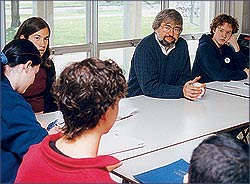


 |
 |
Issue Contents : : Around Tappan Square : : Page [ 1 2 3 4 5 6 7 8 9 ]
First-Year FanfareSmall-group Seminars Are a Big League Hit with new Students
 |
|
| Associate Professor Bob Geitz leads a seminar on information, knowledge, and the internet. Photo by John Seyfried |
|
While there will always be a place for Introduction to Religion or Modern European History on a student's freshman-year course schedule, more and more intro classes are delving into weighty topics, be it biology and religion teaming to debate the ethics of biotechnology, or English literature and African American studies exploring the "coming of age" in African literature.
The vehicle for such learning–Oberlin's First-Year Seminar Program–was launched last year as a way of offering new students the type of intimate classroom experience traditionally reserved for their upper-level peers.
The courses, many of them cross-disciplinary, are designed to develop critical thinking and writing skills, while at the same time grooming new students for Oberlin's intellectually charged environment. Enrollment is small–14 students per seminar–but with enough offerings to benefit everyone.
Faculty members, for their part, get to take an academic leap, as professors–many of them tenured–are asked to design, develop, and teach the courses themselves. But as Associate Professor of Politics Eve Sandberg points out, a first-year seminar "is not a gateway course. It allows for a richer exploration of a particular topic," many times outside the departmental umbrella.
For example, her seminar, War and Power, asks students to consider if the structure of a country's government determines how it makes decisions and pursues war and peace. Students study such topics as Middle Eastern religions and political theory. "My area of expertise is mainly political economy and U.S. foreign policy. I don't specifically study religion, so that's more of a stretch for me," says Sandberg.
Mathematics Professor Michael Henle hopes that his seminar, From Logic to Persuasion to Propaganda, serves as a jumping point to an understanding of the larger world. "Everybody constantly walks around making judgments," he says. "We all want to be right and have this rightness acknowledged by others. The main goal of this course is to become aware of how we make these arguments and perhaps suggest new ways to think about argumentation."
Skill building, be it thinking analytically or writing persuasively, is an important component of the seminar program, whose interdisciplinary approach allows instructors to use a rich array of teaching tools. English Professor Phyllis Gorfain's class, From Page to Stage, considers drama as a medium that exists on the page, but which only truly comes to life when performed on stage. Her students study theatrical scripts, attend live performances, review films, and perform scenes in class.
Seminars are also praised for offering an inviting atmosphere that fosters confident class participants. "The setting allows us to be very intimate in the sharing of our ideas," says Jono Sanders, of his Technologies of Writing seminar. "The teacher can challenge us in ways that would be impossible in other settings. Comparing a large lecture to this class is like comparing a recording to a live concert."
Classmate Sean Nagamatsu '07 agrees. "The seminar is more engaging when compared to my other classes, which are all lecture based. Also, it's nice to have a class with all first-years, because there are hardly any new students in my other classes."
To prepare for the seminars, professors–many of them unaccustomed to teaching first-year classes–attend a two-day workshop to discuss what it means to teach liberal arts effectively at the first-year level. An added benefit for faculty is the sense of community that's fostered beyond departmental boundaries.
"I don't have to teach this course within the curricular goals of a department, and I can be part of a large group of other seminar instructors," says Gorfain, who touts the experience as giving students a solid foundation for their Oberlin experience. "We need versatile problem solving and creative, well-prepared minds to solve enormous problems and imagine a better world."
Want more? Visit www.oberlin.edu/fys/